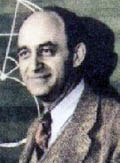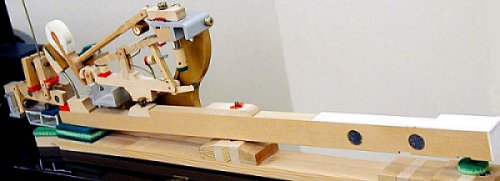Back of an Envelope
Today, we ask, How many piano tuners in Chicago? The University of Houston's College of Engineering presents this series about the machines that make our civilization run, and the people whose ingenuity created them.
 Years ago, physicist Enrico Fermi asked his students at the University of Chicago to estimate the number of piano tuners in town. He didn't send them out to look at the phone book or call the musician's union. He asked them to sit in their chairs making full use of what they already knew. And, once we mull his question, we see great is our capacity for finding an answer without outside help:
Years ago, physicist Enrico Fermi asked his students at the University of Chicago to estimate the number of piano tuners in town. He didn't send them out to look at the phone book or call the musician's union. He asked them to sit in their chairs making full use of what they already knew. And, once we mull his question, we see great is our capacity for finding an answer without outside help:
We know Chicago's population is around three million. From that, we estimate the number of households, guess the fraction that has pianos and how often they're tuned, estimate how many pianos a tuner can tune in that time, and viola! We can do it. (The number varies but it hangs around 130 or so. Try it.)

Fermi was famous for that sort of thing. As he watched the first atom bomb explosion, he scattered torn bits of paper in the blast wind. From their motion he estimated the explosion to be equivalent to something over ten kilotons of TNT. Months later, detailed calculations based on measurements gave 18.6 kilotons.
Here, of course, we need to be clear on our purposes. If I'm buying uniforms for a football team, then I'd better not just guess the number of players or the team might be in deep trouble at game time. But, if I'm deciding whether to quit smoking, my decision won't change if the annual worldwide tobacco death toll turns out to be three million instead of five million.
Naturalists can seldom know animal populations with any precision; but they still have to decide whether or not a particular creature is threatened with extinction. They routinely use Fermi-like information to decide whether they're looking at populations that number in the hundreds or in thousands.
You and I make so many daily decisions, and most depend on partial information. That's why we really need to be able to work on backs of envelopes -- or, more important, on spurs of moments.
Two new factors have entered have our lives since the early '70s. First, pocket calculators began giving eight-decimal-place answers to questions. There was curse in blessing's clothing! Throughout the long reign of the slide rule, engineering students had mentally determined whether their answer was 61 or 6,100. Rapid estimation was a way of life, now seriously diminished.
Then there was the Internet; why estimate when it gives exact answers right now? Fermi, I'm sure, would want us to ask if those answers are reasonable. He'd ask us to do a mental check.
Perhaps pride keeps us from making estimates -- fear that we'll later find it's not a thousand but 860. There, was, it seems, no such hubris about Fermi. He could be found helping students move tables, or working in the shop. He was right more often than most of us, simply because he did not live in fear of falling off his mountain top. He was, quite simply, unafraid of making a quick ballpark estimate of the number of piano tuners in Chicago.
I'm John Lienhard, at the University of Houston, where we're interested in the way inventive minds work.
For more on Fermi and back-of-the-envelope calculation, click here.